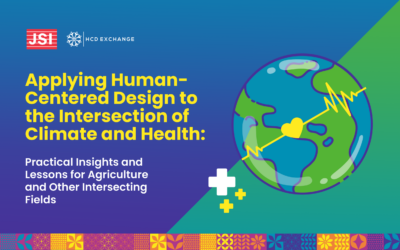The impact of climate change extends beyond environmental damage and erratic weather patterns. We are witnessing how climate-related disasters reduce the quality of life for communities, particularly in Africa and Asia, where health service delivery is being disrupted on a large scale. This disruption exposes priority populations to preventable health risks, especially women and girls who face adverse outcomes when SRH services are abruptly interrupted. The siloed approach to climate-smart adaptation interventions and SRH initiatives has proven inadequate. To confront this reality, programs must adopt a convergent approach to designing SRH-responsive climate adaptation strategies. This will ensure that during climate-related disruptions, populations are not left vulnerable to unplanned pregnancies and sexually transmitted infections.
SRH services are uniquely sensitive to environmental disruptions due to their reliance on timely access. The destruction of infrastructure, such as road networks and health centers, impedes the delivery of critical care, leading to harmful outcomes. A report by the Women and Gender Constituency and the SRHR & Climate Justice Coalition emphasized that lack of access to SRH is one of the leading causes of death among women and girls displaced by extreme climate conditions. In South Asia, a 2024 study by the Asian Development Bank revealed that frequent flooding has severely restricted access to safe abortion services and contraceptives. Similarly, in Kenya’s drought-affected arid regions, women and girls face immense challenges in accessing SRH services, often prioritizing the search for water and food over their health needs.
For communities already grappling with socio-economic challenges, the added strain of climate-related destruction exacerbates vulnerabilities. In these settings, SRH services are often deprioritized in favor of immediate survival needs. However, this neglect only deepens the crisis, underscoring the necessity of resilient SRH systems that can adapt to erratic climatic conditions.
Evidence from Women Deliver’s review on climate change and SRH advocates for investments in resilient health systems. These include mobile health clinics, telemedicine, and community-based health workers who can provide care when traditional facilities are inaccessible. For instance, in Malawi, community health workers have been trained to deliver contraception and maternal health services in flood-affected areas, ensuring that care continues even during health system disruptions. Models like these assure continuity of care in climate-vulnerable regions.
Yet, climate adaptation strategies often focus on disaster risk reduction and water management without integrating SRH services. This lack of intersection weakens overall resilience. Governments and program implementers must incorporate SRH into climate adaptation efforts to create holistic approaches promoting health and community resilience. In the Philippines, the government successfully included family planning services in its climate adaptation programs, ensuring access to contraceptives in flood-prone areas and reducing the strain on health services during resource shortages.
For SRH and climate adaptation mechanisms to be truly effective, they must be community-centered, co-developed, co-designed, and co-owned by the people they aim to serve. This ensures that interventions reflect the specific needs of local communities and remain sustainable. HCD offers an approach that positions solutions within the lived realities of individuals, fostering empathy and collaboration. The challenges communities face do not occur in isolation, neither should the solutions. Recognizing the interconnectedness of climate change, SRH, and adaptation strategies can ensure positive health outcomes for vulnerable populations in Africa, Asia, and beyond.
Reference Materials
- Climate Justice and Sexual and Reproductive Health and Rights
- The impact of climate change on women’s health
- The Young Girls at the Forefront of Climate Action in Kenya’s Pastoralist Community
This opinion piece has been written by Belindar Kwamboka and edited by Rimjhim Surana and Muthoni Wachira.




